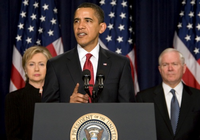The following op-ed has been adapted from the Project for National Security Reform's recently released report (.pdf), "Turning Ideas Into Action." It is the third of three that WPR has featured. The first can be found here. The second can be found here.
The National Security Act of 1947 established the National Security Council (NSC) to draw upon the expertise of the diplomatic, military, and intelligence departments and agencies to advise the president and coordinate policy. Today's NSC consists of the president as well as select department secretaries and agency heads. A national security adviser and a small National Security Staff support the NSC's policy development and coordination roles.
Although the NSC staff has grown in influence since its creation, the council and staff continue to be used primarily to drive national security policymaking, manage crises, and provide critical staffing support to the president. In its landmark study, "Forging a New Shield(.pdf)," the Project on National Security Reform (PNSR) documented how the NSC's current staff structure, processes, and size are typically overwhelmed by urgent issues, crowding out important core functions of strategic management.

